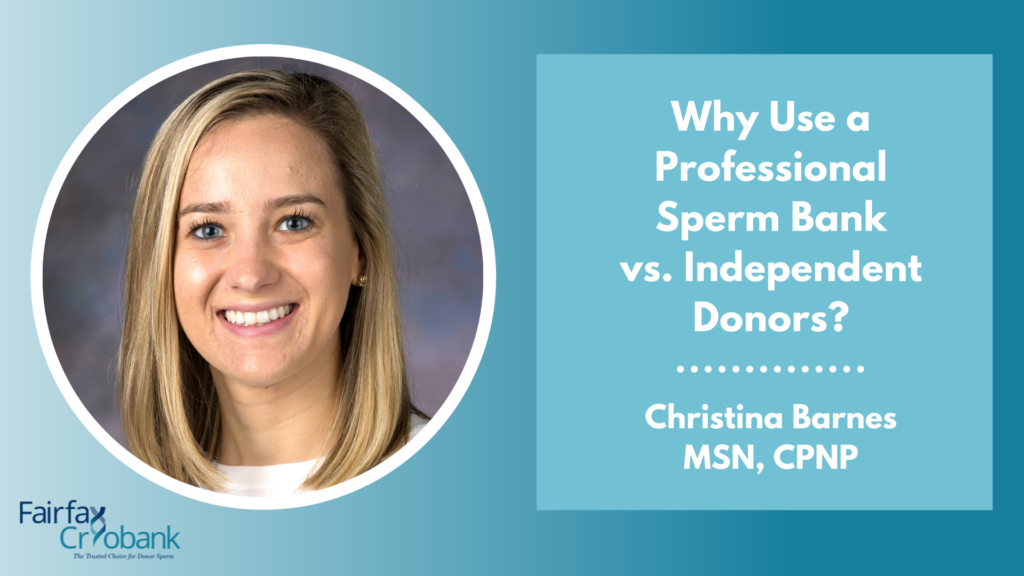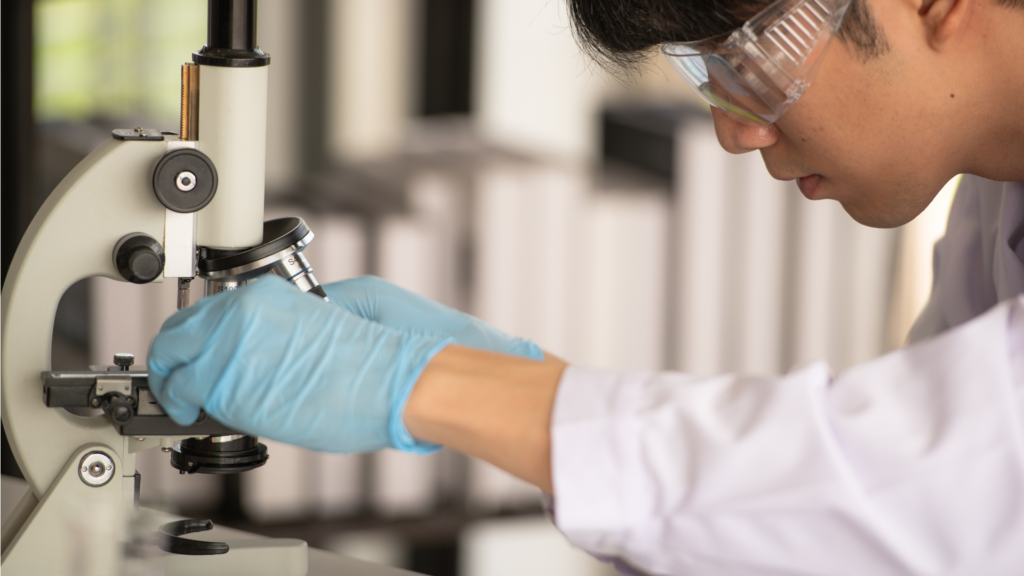Why Use a Professional Sperm Bank vs. Independent Donors?
Guest Blogger, Christina Barnes, MSN, CPNP, explains the benefits of using a professional sperm bank over independent donors.

If you’re considering using donor sperm to grow your family, you may be wondering whether using a professional sperm bank is really worth the cost. Perhaps you’ve found an independent donor, either through a friend or social media, who would be willing to donate sperm. Before you get pregnant, it’s important to make sure that your health, your baby’s health, and your legal rights are protected.
“Making the investment in donor sperm from a licensed sperm bank gives you the security of knowing that the donor’s background, psychological health, and education have been screened in addition to the critically important physical, genetic, and infectious disease testing and screening information” said Dr. Michelle Ottey, Fairfax Cryobank Laboratory Director.

A professional sperm bank offers a level of security that may not be possible when connecting directly with an individual. While your known donor may be a handsome CEO who runs marathons in his free time, he may not think to tell you that his mom’s brother died as a young child. A deceased uncle might not sound as important as his intellect or his physical fitness, but this could actually be a sign of a genetic disease that you’d risk passing on to your child. Plus, who knows if this handsome runner will be willing to donate sperm in 3 years, when you and your partner decide that you want your child to have a sibling.
There’s a lot to consider when choosing a sperm donor, and what works for one family may not work for another. However, if you’re deciding which route to go, the following benefits of using a professional sperm bank may help with your decision:
Extensive Medical and Genetic Testing
Medical testing and screenings are done by experienced physicians and genetic counselors.
Donors undergo a complete physical examination by a physician and submit up to 4 generations of family medical history. They also complete genetic testing to see whether they carry any genetic diseases. Many men who apply to become donors do not make it past this point. A family history of something as common as early onset heart disease or diabetes may cause the applicant to be denied.
“If the applicant has a genetic disease himself or a strong family history of a heritable disease, he will be rejected and not allowed to donate” said Suzanne Seitz, Genetic Counselor at Fairfax Cryobank. “Even ADHD or a history of addiction will lead us to reject the applicant.”
At Fairfax Cryobank, all applicant medical and family histories are reviewed by the Medical Director Dr. Harvey Stern, a medical geneticist. He evaluates these histories and genetic testing results to determine if the man would be a safe, healthy donor. Fairfax Cryobank is the only sperm bank that has a medical geneticist review each applicant’s medical information.
Infectious Disease Testing
Donors are tested for STDs more than once to make sure you’ll be safe.
All donors are tested for sexually transmitted diseases before they donate and then again 6 months after they give sperm. All sperm specimens are quarantined for 6 months and released for sale once the donor re-tests and is negative for all tested STDs. In doing this, the sperm bank makes sure the donor really was negative for say, HIV, at the time he gave sperm. If the donor was infected with HIV a few days before he donated, he may have tested negative at the first test but would test positive 6 months later.
At Fairfax Cryobank, every donor active after May 2005 has been tested for the following diseases:
- HIV-1 and HIV-2
- Hepatitis B
- Hepatitis C
- Cytomegalovirus (CMV)
- HTLV-I and HTLV-2
- HCV
- Chlamydia
- Gonococcus
- Herpes Simplex Virus I and II
- Human Papillomavirus (HPV)
- Adenovirus, Trichomonas, Candida and Actinomyces tested when indicated

Psychological Testing
The Personality Assessment Inventory (PAI) screens for multiple mental health issues.
All donors complete the Personality Assessment Inventory, or PAI. The PAI is a 344-question document that looks for signs of mental illnesses, behavior disorders, and impulse control problems. Dr. John Kurtz, one of the top experts in the field, reviews each test and provides feedback. If a man’s test reveals signs of mental illness or more subtle issues, his application to become a donor will be rejected.
Extremely Selective Donor Application Process
Less than 1% of applicants actually become donors.
Fairfax Cryobank screens over 7,000 men per year, and of those applicants less than 1% are approved to become sperm donors. The screening process is time-consuming and thorough, consisting of multiple medical screenings and tests.
“It is unlikely to find someone in the general population who is already screened for genetic diseases,” said Suzanne Seitz. At Fairfax Cryobank, “genetic testing results are available for free for each donor.” By the time the donor is available, the results have already been reviewed by Dr. Stern.
There are many things that would prevent a man from becoming a donor at a sperm bank, and some of these things you may never have even thought to ask about. If the applicant or his sibling were born with a congenital birth defect, the applicant would be rejected. If the applicant has diabetes or heart disease, he would be rejected.

Semen Quality Testing
Semen analysis looks at the quality of a donor’s sperm.
Every donor’s sperm is analyzed in the lab before samples are made available to purchase. Laboratory technicians evaluate for sperm volume, pH, sperm count, motility, progression, viability, abnormality, and white blood cells. A man’s semen analysis must be acceptable in order for him to donate to a professional sperm bank.
The semen specimens are also frozen and thawed for a post-thaw analysis. Any applicant whose specimen does not meet the minimum post-thaw standard of 20 million total motile cells/ml will be rejected.
Legal Security
The donor has already given up all legal parental rights.
Deciding to use a sperm donor usually means that you don’t want the donor to be the child’s legal father. You, and your partner if you have one, are the parents. You provide for your child emotionally and financially, and you don’t expect a donor to take on those responsibilities. If you don’t take the necessary legal steps to protect you and your family, you may find yourself in a situation where the donor keeps certain parental rights. With a professional sperm bank, these boundaries have been clearly defined and your family is legally protected.
“When you use donor sperm from a sperm bank, the donor has signed a donor agreement that specifically relinquished all parental rights” says Dr. Michelle Ottey. “Parentage laws vary state to state and setting up agreements with individuals found online can be complicated and expensive but are necessary to protect your family.”
Genetic Siblings
Sperm banks let you purchase more samples now to use for future children.
Do you want more children? Do you want your child’s siblings to be full genetic siblings, meaning they share the same biological parents? If so, using a professional sperm bank can ensure that you have access to the same donor’s sperm in the future.
“If you are interested in having more than one child and have the means, you can purchase additional vials of donor sperm from the sperm bank and store with us for your future use,” said Dr. Michelle Ottey. “If using someone found online, you may not have that option because their availability may change, their infectious disease status may change, or something unforeseen may get in the way.”







